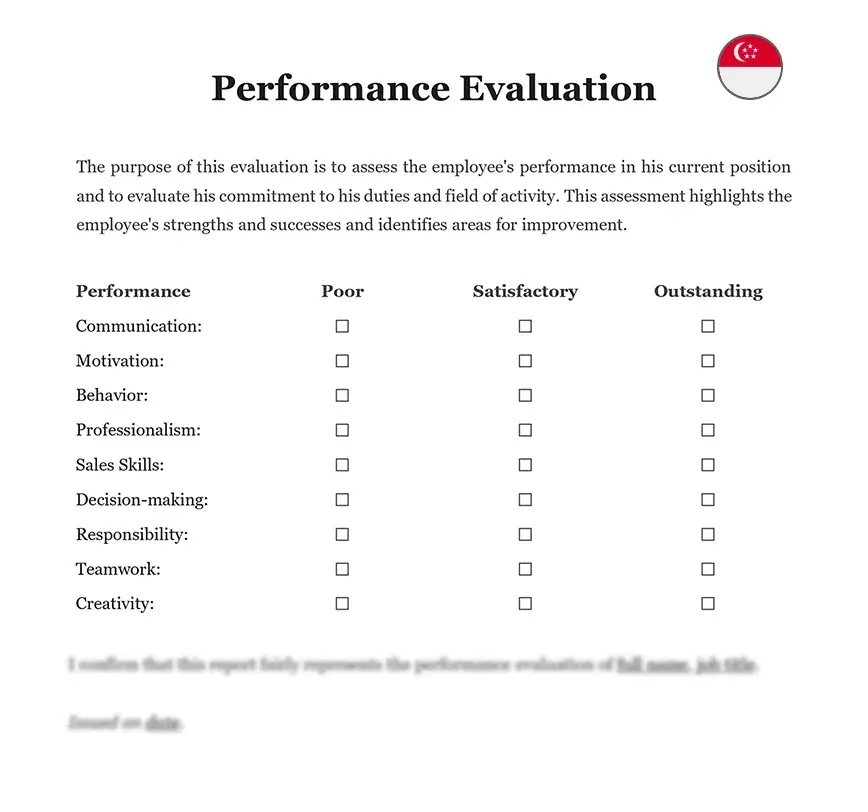Ready to use legal template
Work on without any hassle
Compliant with Singapore law
Ready to use legal template
Work on without any hassle
Compliant with Singapore law
Learn more about Employee Performance Evaluation in Singapore
Employee Performance Evaluations are intended to assess overall performance as well as progress toward specific goals. Performance reviews, when properly structured, provide an opportunity to recognize an employee’s work, identify opportunities for improvement, and identify training and professional development required to move forward. Thus, an employee performance evaluation in Singapore can be used to evaluate the progress of employees in the company by collecting information about their skills, goals, and accomplishments. With our performance appraisal, you will be able to collect all of the information from your Singaporean or foreign employee to determine which areas are performing well and which areas require improvement for your team.
Table of contents
What is an Employee Performance Evaluation?
An employee performance assessment, sometimes known as a “performance review,” is a procedure used by firms to provide workers with feedback on their job performance and formally document that performance. Although each company determines its own assessment cycle, most conduct employee performance reviews once a year.
Some organizations also perform assessments when employees come to the end of their original probationary period. Those who perform well on the examination are often removed from probationary job status. Evaluation information is saved in the employee’s file and may be required by potential employer or institutions of higher education. Performance assessments differ greatly in structure and content among sectors and enterprises. They might comprise rating scales, self-assessment checklists, official observations, or performance assignments.
Is doing employee review important in Singapore?
Employee performance reviews provide several potential advantages for both employees and businesses.
Employers should
Some of the advantages of assessments for employers are as follows:
1. Protection against legal action: When current or former workers take legal action against a corporation, having detailed evidence of that employee’s performance is critical. This is especially important when an individual is dismissed or rejected for a promotion. In these circumstances, the performance review can be used as objective data to back up the company’s decision-making.
2. Promotion of good work: Given the hectic pace of many firms, an employee performance assessment may be one of the rare occasions when managers provide organized positive feedback and reinforcement to their staff. This raises employee morale, demonstrates what to continue doing, and contributes to the development of a strong connection between the company and the employee. Employee turnover can be reduced if employees can see how their labor is valued and useful.
3. Educating hiring procedures: When taken together, employee performance assessments can provide important insight into past recruiting and/or hiring processes and shape future procedures.
For workers
Some of the advantages of employee performance reviews for employees are as follows:
1. Development and growth: Employee performance reviews provide managers a committed opportunity to focus on personal performance as well as chances for growth and development. This is a great moment for employees to talk about their salaries, career ambitions, and what they need to do to get there. Employers and workers can design a growth plan that increases the employee’s abilities and helps the organization by finding areas of strength and areas for progress. This can pave the way for long-term job progress and achievement.
2. Visibility of senior leadership: There may be members of high management who are not immediately available and do not engage with employees on a regular basis. The performance review process may give these executives information about the workforce, such as who the top performers are and where to promote promotional possibilities.
3. Possibility of a wage raise and/or bonus: Employees who perform well on assessments are given merit-based pay increases and/or incentives in some firms. A positive performance assessment may also lead to prospects for progression within the organization. This can involve official progression in the form of a promotion or the assignment of leadership duties.
4. Communication has improved: A planned employee performance evaluation encourages fruitful collaboration. It provides tools to manage the dialogue and offer highly detailed feedback for both positive reinforcement and constructive criticism. When addressing something difficult, this might help to reduce tensions. In certain cases, this procedure allows for more meaningful dialogue outside of the review process.
Why use an Employee Performance Evaluation template?
Fill out our employee performance assessment form to rapidly evaluate your personnel. This form is available for download in Word format, allowing you to delete or add items or information to our forms. Interaction, ambition, attitude, professionalism, entrepreneurial capacity, decision making, responsibility, cooperation, and creativity are all included in our forms.
How is employee performance assessed?
Because each function is unique, the measures used to assess employee performance will ultimately be determined by the sort of business in which the organization and its workers operate.
However, the major approaches to assess performance in general are:
| Work of high quality | The quality of work performed is an important measure of performance. Are staff making every effort to provide high-quality results? Are performance goals being met? The basis for analyzing all other aspects of their performance is the quality of their job |
| Rapidity and effectiveness | How does the amount of work done by workers in a regular week, month, or quarter compare to your expectations? Are deadlines met, significantly improved, or time wasted? Are shortcuts being taken in order to complete job quickly? Efficiency is defined as maximum production at the lowest possible cost, and it is critical to understand this inside your organization |
| Consistency and trust | Consider if you trust your staff to do all of their tasks at a high quality and on schedule. High-performing personnel can be given liberty and continue to achieve excellent outcomes without constant monitoring. When conducting individual employee performance evaluations, keep these performance measures in mind |




